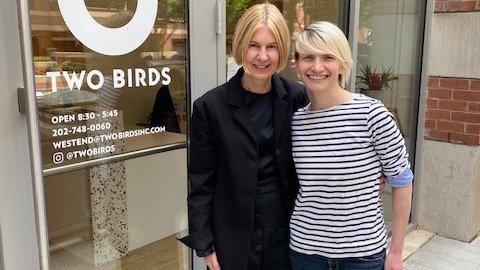TOPEKA — Women entrepreneurs with children need more flexible and affordable child care services or their businesses could suffer, according to a study released Tuesday. The study, conducted as part of the United WE l project, was funded by the Ewing Marion Kauffman Foundation.
“The child care needs of female entrepreneurs are a critical topic for the future of the U.S. economy and the advancement of women in business,” said Wendy Doyle, the company’s president and CEO. United WEa Kansas City, Missouri, organization that promotes women’s role in civic life.
the study, “We value the economy” is a survey of 750 female business owners across the U.S. who have children under the age of 6. The women came from 45 states, 35 percent were non-white, and 31 percent came from households earning less than $50,000 a year.
Here’s what was found:
Business Costs
The lack of adequate child care negatively impacts women’s businesses, especially those earning more than $1 million a year.
Of the women surveyed, 57.1% said their business would be more successful if childcare services were more suited to their needs, and over 60% agreed that not having childcare services that fit their needs would negatively impact their ability to run their business.
Respondents who work more than 30 hours a week or have a total annual income of more than $1 million were more likely to say a lack of adequate child care facilities has negatively affected their business. Half of those who work fewer than 30 hours a week felt their business would be more successful if they had child care facilities that better suited their needs, compared to 60 percent of those who work more than 30 hours a week.
Among respondents whose businesses have annual gross revenues of less than $1 million, 53% felt they would be more successful if they had child care that better suited their needs, while 74% whose businesses have annual gross revenues of more than $1 million said the same.
Main needs
The primary needs identified were flexible schedules, care for infants and toddlers, and early morning and evening hours.
About 30 percent of respondents wanted a more flexible schedule, 29 percent wanted child care for infants and toddlers, and 27 percent wanted early morning and late night hours.
Early childhood care “is a problem. It’s a problem everywhere. It has to do with the business model of child care,” said Tim Green, director of research and data. “Younger children have greater needs, so you need more staff per younger child.”
Weekend childcare, after-school childcare, part-time childcare, childcare during summer and winter holidays, and night-time childcare were all cited as needs.
This reflects the entrepreneur’s non-traditional business hours.
“Childcare was designed for the old economy, based on the nine-to-five job,” Green said.
Green said schedules can be fluid and the system isn’t built to support women in such roles.
Formal and informal care
Respondents who work more and earn more are more likely to rely on formal child care rather than informal arrangements.
Informal care includes having a friend, family member, partner, or nanny look after your child. Formal care includes daycare centers, preschools, and after-school programs.
One-quarter of respondents with total business revenues over $100,000 did not use formal care, whereas 75 percent of respondents with total business revenues over $100,000 used formal care.
Women entrepreneurs are also learning how to combine these types of care.
Kelsey Lentz, Founder and CEO Two Birds Daycare and Schoolhas three children under the age of six and is pretty familiar with the world of childcare.
“Child care has only existed as an either/or solution,” Lenz says, “either the traditional approach of dropping off your child in the morning and picking them up in the evening, which has very little connection to the child’s community, or at the other end of the spectrum, some versions of home-based child care, which are a patchwork of child care that relies heavily on the village.”
Lentz wanted full-time child care. She wanted to return to work quickly, but also wanted to be able to breastfeed her baby during the day. She wanted to feel part of a community. She heard from other mothers who felt the same way.
So she founded Two Birds, which Lentz says is “a comprehensive approach to family childhood.”
Two Birds has on-site co-working space, weekend extracurricular activities, parent classes and full-time early education from Monday to Friday.
But that level of child care can be expensive.
Green said a 2023 analysis from the U.S. Department of Labor found that child care costs are high for the average family in all 50 states, and that analysis is what prompted United WE to ask these questions and conduct this survey.
United WE recommends that “policymakers need to support child care like other important business elements to ensure women entrepreneurs have reliable and flexible child care coverage,” Doyle said. She said that could be done by expanding the Child and Dependent Care Tax Credit and supporting the Small Business Child Care Investment Act.

